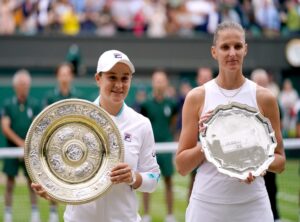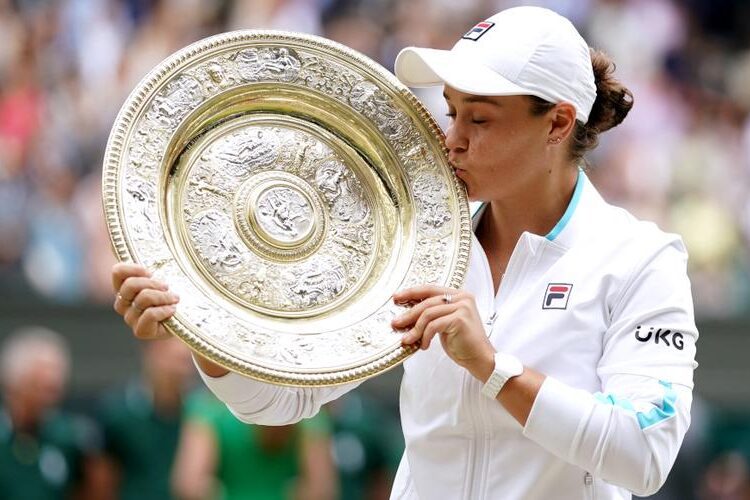WIMBLEDON, England – World number one, Ashleigh Barty, became the first woman from Australia in 41 years to win the Wimbledon singles title.
Everything came so easily for Australia’s Barty at the start of the Wimbledon final. Hard to believe one player would grab the first 14 points of a major championship match. Surely, it couldn’t stay that one-sided, right? Of course not.

Still, Barty used that perfect start and a strong-enough finish to get the job done, holding off Karolina Pliskova’s comeback bid to win 6-3, 6-7 (4), 6-3 at the All England Club for her second Grand Slam title.
“It took me a long time to verbalize the fact that I wanted to dare to dream it and say I wanted to win this incredible tournament. I didn´t sleep a lot last night. I was thinking,” the No. 1-ranked Barty said according to AP. “But I think when I was coming out on this court, I felt at home, in a way.”
She adds this trophy to the one she won at the French Open in 2019.
Barty is the first Australian woman to win Wimbledon since Evonne Goolagong Cawley in 1980. Barty was a teenager when they first met and she considers Goolagong Cawley an inspiration and a mentor.
Evonne is a very special person in my life,” said Barty, whose outfit was a tribute to the dress Goolagong Cawley wore when she won the tournament for the first time, 50 years ago. “I think she has been iconic in paving a way for young indigenous youth to believe in their dreams and to chase their dreams. She´s done exactly that for me as well.”

Barty, 25, was the Wimbledon junior champion a decade ago, then left the tennis tour for nearly two years in 2014 because of burnout. She played professional cricket back home, then eventually returned to her other sport.
She was at her best at the beginning of each set against the eighth-seeded Pliskova, a 29-year-old from the Czech Republic with a big serve.
Pliskova dropped to 0-2 in major finals; she also was runner-up at the 2016 US Open.
“Horrible start,” said Pliskova, a former No. 1. “That´s why I´m more, like, proud about the way (I found) a way back in that match.”
She trailed by a set and a break in the second, and Barty served for the victory at 6-5.
But Barty sailed consecutive forehands long to get broken, then ceded the tiebreaker with a double-fault.
“She dug deep,” Barty said, “and found a way to claw herself back into the match.”
In the first Wimbledon women’s final to go three sets since 2012, Barty went up 3-0 in the decider and never relented. It also was the first since 1977 between two participants who never had been that far at the All England Club.
With an audience that included Prince William and his wife, Kate, and actor Tom Cruise, the match was played under a cloud-filled sky at Centre Court. Because of the threat of showers, Barty and Pliskova shared a warmup session under the closed roof at No. 1 Court earlier in the day.
They smiled and chatted during the coin toss before the final, but once things got serious, Barty didn’t mess around.
Right from the get-go, there was not a hint of uneasiness or uncertainty. Her strokes were confident. Her demeanor, too. During the match-opening run that put her up 3-0, love-30 and, after Pliskova finally won a couple of points, 4-0 after 11 minutes, Barty showed off her varied skills.
She returned Pliskova´s speedy serves – the ones that produced a tournament-high 54 aces entering Saturday – without any trouble. She lobbed Pliskova, who at 6-foot-1 is 8 inches taller than the 5-foot-5 Barty. She hit winners with heavy topspin forehands and set up others with sliced backhands. She threw in an ace of her own, and even compiled more than Pliskova, 7-6.
“She didn´t really miss much. She played everything super deep,” Pliskova said. “I think it was tough for me to really play my game in that moment.”
The key stat probably was this: Barty won 22 of 31 points that lasted nine strokes or more.
As balls flew past Pliskova, and the murmuring in the full-capacity stands reached a crescendo, she watched with little more than a blank stare. She fiddled with her racket strings as if she’d rather be anywhere else and, indeed, said afterward: “I didn´t feel like I (wanted) to be there.”
“Being able to reset at the start of the third was really important, just for me to continue to turn up each and every point,” said Barty, who climbed into the stands to hug her coach, Craig Tyzzer, and others.
“That´s all I was really focusing on, just trying to do the best I could every given point, regardless of what the scoreline was.”






Discussion about this post